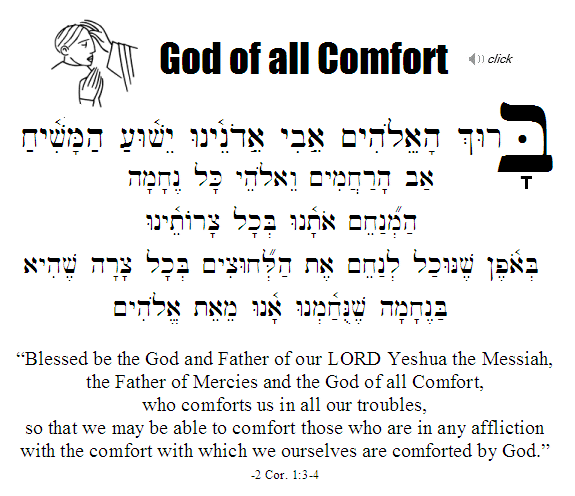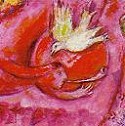|
Jacob's son Benjamin (בִּנְיָמִין) served as a living link to his beloved wife Rachel (who had died earlier while giving him birth). If Jacob had initially regarded Joseph as the bechor (firstborn) of the family, Benjamin surely assumed his "coat of many colors" after his older brother was assumed to be dead. Indeed, Benjamin represented the last thread of Jacob's original vision and hope in this world. The children from Leah and the concubines were of course important to him, but Rachel always remained his first love, and after she died giving birth to Benjamin, Jacob could not help but hold him close...
In Hebrew, Benjamin means "son of my right hand" (from בֵּן, "son" + יָמִין, "right hand"), though in the Samaritan Torah the name is written as Benjamim (from בֵּן, "son" + יָמִים, "days"), meaning "son of days," perhaps alluding to the age of Jacob when Benjamin was born (Rabbinic tradition says he was 100 years old). As the last link to Jacob's deceased wife Rachel, Benjamin had taken Joseph's place as Jacob's favorite son, and Jacob was unwilling to part from him. Perhaps Jacob secretly feared that God would command him to sacrifice his "only begotten son," just as He had earlier tested his grandfather Abraham regarding his father Isaac. But wasn't the loss of Joseph enough of a sacrifice? Would he also be required to "offer up" Benjamin? Whatever he was thinking, it is clear that Jacob was unwilling to let go of his son - and his lack of trust created an abiding insecurity and heartache within him....
In last week's Torah portion (Miketz), we read that when Jacob asked the brothers to return to Egypt for more food, they said they could not do so without taking Benjamin. Jacob then replied, "Why did you treat me so badly as to tell the man that you had another brother?" (Gen. 43:6). The Midrash Rabbah (Bereshit 91:10) states that Jacob never spoke inappropriately except for here. God said, "I am busy establishing a kingdom over Egypt and Ya'akov is asking why he was treated so badly?" The LORD was busy putting all the pieces together, though Jacob could not see beyond his own personal fear and pain...
The nisayon (test) of Jacob reminds us of the principle: gam zu l'tovah (גַּם זוּ לְטוֹבָה), "this too is for good" (cp. Rom. 8:28). Notice, however, that the principle is not stated, gam zu tovah - "this is good," but rather gam zu l'tovah - "this, too, is for good." The little preposition here (-ל) is crucial. The heart of faith does not affirm that "whatever happens, happens" and therefore we should passively accept the injustices and pain of life without any form of protest. Unlike some other religions, the LORD God of Israel does not demand slavish "submission" to His will, much less does He desire "karma-like" indifference to the suffering we see in the world (Phil. 2:4; 1 Pet. 5:7; Heb. 4:16, James 4:9, etc.). Having faith that God will one day "wipe away every tear" does not deny the existence of evil nor does it suppress real tears from being shed; however, genuine faith affirms that real (existential) comfort is coming, and that sadness, pain, and suffering will not be given the last word....
Faith (i.e., emunah: אֱמוּנָה) is a "double movement" of the heart. It both "sees what is invisible" (2 Cor. 4:18) and understands (i.e., accepts) that the "present form of this world is passing away" (1 Cor. 7:31). Faith rests in God's providential hand over the chaos and flux of creation. The eye of faith beholds the Presence of God and His reign over all the mundane affairs of this world. Indeed, it is only by fixing our hope upon the eternal that we are enabled to rightly apprehend the nature of the temporal world itself. In fact, the word emunah shares the same root as the Hebrew word for truth (אֱמֶת). In that sense, "seeing what is invisible" (τὰ μὴ βλεπόμενα) is a more fundamental type of "seeing," since the truth of hope ultimately interprets all other ways of seeing...
Emunah therefore understands temporal suffering as part of the greater purposes of God in the world. It sees beyond the painful moment and trusts that God is "busy putting all the pieces together." Everything has a reason, and that includes the seemingly trivial as well as the obviously tragic. The life of emunah calls us to live as toshavim (תוֹשָׁבִים) - sojourners - who are put at a "distance" from the world of appearances. Faith leads to a form of divine "homesickness," a cry of protest over the state of this world and its evils, and a gnawing hunger for love and truth to prevail in the world. By itself, emunah would die of intolerable heartache were it not for the gift of God's comfort. Indeed, the Scriptures describe God as Av Ha-Rachamim (the Father of mercies) and the God of all comfort:
Hebrew Lesson
2 Corinthians 1:3-4 reading (click):

The blessing continues: "who comforts us in all our affliction, so that we may be able to comfort those who are in any affliction, with the comfort with which we ourselves are comforted by God" (2 Cor. 1:4). Note that Paul links our present suffering (πάθος, pathos) with a divinely imparted comfort (παράκλησις, "paraklesis"), which he regards as a state of blessedness. God Himself "calls us to His side" (from παρά + καλέω) in the midst of our afflictions and pain.... The Greek text reads, ὁ παρακαλῶν ἡμᾶς ἐπὶ πάσῃ τῇ θλίψει ἡμῶν, and might be better rendered as, "The one calling to us [to His side] in all our tribulations" (2 Cor. 1:4). God doesn't want us to go through pain by ourselves, all alone. He invites us to come to His side for comfort... Yesh ohev davek me'ach: "There is a lover who sticks closer than a brother" (Prov. 18:24b).
The purpose of our afflictions is to learn to let go of what we value in the world in order to attain to a better hope. טוֹב־לִי כִי־עֻנֵּיתִי לְמַעַן אֶלְמַד חֻקֶּיךָ / "It was good for me that I was afflicted, that I might learn your statutes" (Psalm 119:71). God calls out to us in our tribulations so that we may turn away from our illusions and seek refuge in His Presence. Suffering is a tool that only God has the wisdom to use as a means of blessing in our lives. As A.W Tozer once wrote, "It is doubtful whether God can bless a man greatly until He's hurt him deeply," and as Charles Spurgeon likewise affirmed:
Trials make more room for consolation. There is nothing that makes a man have a big heart like a great trial. I always find that little, miserable people, whose hearts are about the size of a grain of mustard-seed, never have had much to try them. I have found that those people who have no sympathy for their fellows -- who never weep for the sorrows of others -- very seldom have had any woes of their own. Great hearts can only be made by great troubles. The spade of trouble digs the reservoir of comfort deeper, and makes more room for consolation. God comes into our heart -- He finds it full -- He begins to break our comforts and to make it empty; then there is more room for grace. The humbler a man lies, the more comfort he will always have. (Spurgeon, Consolation Proportionate to Spiritual Sufferings, 1855).
There is an "eschatological" aspect to suffering for the person of faith. Present suffering will ultimately be redeemed as soul-building, but this does not mean that we should act Stoically or admonish others to suppress their heartache. If one of us hurts, so does the rest of the body (1 Cor. 12:26). This isn't sanctimonious humbug; there's no "double talk" going on here. The most succinct verse in the New Testament on this subject is but two words: "Jesus wept" (John 11:35). Nonetheless, we can find great comfort by heeding the voice of pain as a disguised message from God. God calls to us in all our tribulations so that we might make our refuge in Him.
We all suffer and therefore we all exhibit some degree of self-pity in our lives. May God give us the courage to share our hearts with Him and to find abiding comfort in His Presence, chaverim. May it please the Lord to impart to us greater trust in His providential care and love - even in the midst of the challenges and heartaches of this life.
|



